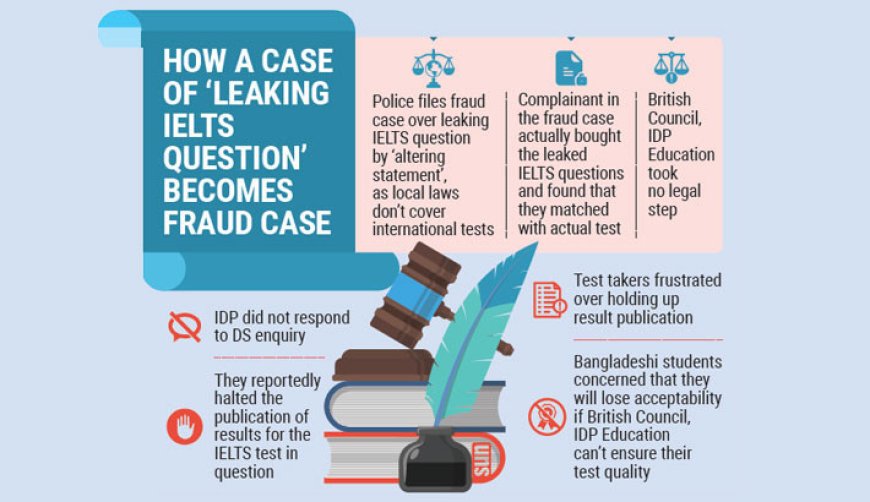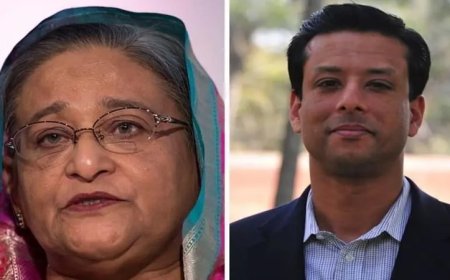IELTS Question ‘Leak’ Exposes Legal Loophole
Police have arrested two individuals with Tk8.38 lakh while they were collecting money from IELTS examinees in exchange for leaked question papers.

A recent incident involving an IELTS “question leak scam” has exposed significant loopholes in Bangladesh’s legal framework concerning international and private examinations, which are governed by foreign entities operating beyond the reach of local laws.
On 6 September, acting on a tip-off, Banani police arrested two individuals — Md Mamun Khan (37) and Poonam Halder Keya (26) — and detained a student, Nadit Hasan Rocky (20), from a hotel in the capital. The trio was found with Tk8.38 lakh, allegedly collected from IELTS examinees in exchange for leaked question papers ahead of the exam.
Law enforcement officials initially planned to file a case under the Public Examinations (Offences) Act, 1980. However, they soon discovered that the law does not apply to international exams such as IELTS, PTE, TOEFL, SAT, O Level, and A Level. Consequently, police filed a fraud case under Sections 406 and 420 of the Penal Code against Mamun and Keya, naming Nadit as the complainant.
In his statement, Nadit claimed that he and several others had paid between Tk1.8 lakh and Tk3 lakh each to obtain IELTS questions. However, the leaked questions only partially matched those that appeared in the actual test. Notably, before the case was filed, he told police that the leaked questions matched the real ones “hundred percent.” The Daily Sun reportedly holds a recording of his initial confession.
When asked about the case, Banani Police Station Officer-in-Charge Rasel Sarwar told The Daily Sun on 22 September that the case narration had to be altered because the existing laws did not cover such offences. He explained that police cannot prosecute individuals involved in leaking IELTS questions — only public examination leaks fall under the law’s scope. For IELTS, only IDP Education or the British Council can initiate legal proceedings.
The Legal Gap
Under Bangladeshi law, only question leaks involving public examinations — such as SSC, HSC, BCS, or university exams — are treated as criminal offences. The Public Examinations (Offences) Act, 1980 defines “public examinations” as tests conducted, organised, or controlled by universities, examining boards, or other authorities established under Bangladeshi law.
Section 4 of the Act stipulates that leaking question papers before an examination can result in imprisonment of up to four years and a fine. However, legal experts note that the Act was designed exclusively for domestic exams overseen by national education boards.
Since IELTS, PTE, SAT, TOEFL, O Level, and A Level exams are administered by international bodies rather than local authorities, they fall outside the Act’s jurisdiction. As a result, police were unable to file a case accurately describing the offence and were forced to pursue fraud charges instead.
Prominent public interest lawyer Manzill Murshid said, “The Banani police had to file a case for breach of trust as the existing law doesn’t cover this. But the unfortunate part is that the student who paid for the leaked questions is also an offender — just like the one who sold them.” He added that the altered case statement weakened the legal proceedings.
Barrister Kazi Tamrin Rashed, a member of the Law Faculty at North South University, told The Daily Sun, “Since the British Council and IDP are international entities, we cannot take direct legal action under our current laws. It is their responsibility to hold the culprits accountable. If they remain indifferent, this will seriously damage Bangladesh’s legal credibility and reputation.”
Students have also voiced concern over the lack of accountability. “If this continues, we’ll lose global credibility,” said Monnujan Khan, a law student at North South University. “It’s up to IDP Education and the British Council to act. Otherwise, Bangladeshi students may soon face distrust from foreign universities.”
Asked about the legal limitations surrounding international exams, Supreme Court lawyer Zahirul Islam Khan Panna said, “Any offence must be addressed within our existing legal system, and I believe action can still be taken if the Public Examinations (Offences) Act, 1980 is properly interpreted.”
Calling the IELTS question leak “disgraceful and reprehensible,” he added, “This is a grave injustice to thousands of students. A Public Interest Litigation (PIL) should be filed to ensure accountability and justice.”
Neither the British Council nor IDP Education has filed a case over the incident, nor is it known whether they have taken any internal action. However, they reportedly withheld the publication of results for the affected IELTS session.
IDP Education on 23 September for comment, but aside from an automated acknowledgment promising a response within two working days, no reply was received by the time of filing this report.
What's Your Reaction?






















































































